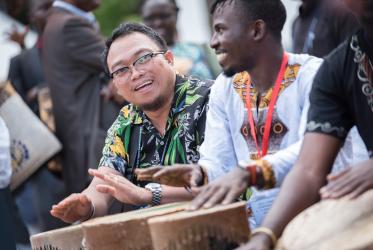An ecumenical workshop held recently in Matanzas, Cuba strongly promoted life-affirming epistemologies that can help to envision and construct alternatives to inequitable and destructive socio-economic systems that prevail in today’s world.
“Epistemology” refers to a branch of philosophy concerned with the nature and scope of knowledge.
The workshop participants reflected on how “life-destroying” approaches to life can be unlearned – and a process of “relearning” alternative approaches that nourish the wellbeing of communities and sustain the entire ecological web.
The event, titled Oikotree Workshop on Transformative Education, brought together more than thirty participants from diverse faith traditions, including educators and activists from around the world. The event was sponsored by the World Council of Churches (WCC), the World Communion of Reformed Churches (WCRC) and the Council for World Mission (CWM).
The Oikotree movement was initiated by the WCC, WCRC and CWM as an ecumenical space where people may seek solidarity in faith while living in the midst of threats based on oppression, economic injustice and ecological destruction.
While in Cuba, workshop participants visited Matanzas Slavery Museum – which highlighted the complicity between religion, economics and politics in a colonial project that caused tremendous suffering, spanning centuries and continents.
The participants ended their visit with sharing of a meal called Ajiaco. “Ajiaco is a traditional Cuban stew made with a variety of indigenous root crops and other ingredients – it symbolizes community, well-being and a deep connection with the land,” explained Rev. Dora Arce-Valentin of the Presbyterian Church in Cuba and executive secretary for justice and partnership in the WCRC.
Innovative examples that foster critical learning and formation, such as the Oikos Theology Movement in the Republic of Korea, were discussed at the workshop.
“The Oikos Theology Movement is of the view that traditional, Western-oriented theological education is vastly insufficient, especially in addressing the massive ecological challenges we face; therefore a new framework based on indigenous and holistic concepts such as Sangsaeng (mutual living), Ubuntu (“I am because you are”) and Sumak Kawsay (good living) is needed,” said Rev. Dr Park Seong-Won from the Republic of Korea and coordinator of Oikotree.
The workshop closed with an interfaith solidarity service organized by the Christian Council of Cuba in Havana to celebrate the recent release by the United States government of the remaining three members of the “Cuban 5” who were accused of spying in Miami in 1998.
Antonio Guerrero, one of the five, recounted that, in his many years of detention, he was allowed to read only the Bible. “The message of the Bible may be reduced to two points – justice and peace,” he said. Justice and peace are also the driving themes of a “pilgrimage” initiated by the WCC 10th Assembly, which was held in Busan, Republic of Korea in 2013, also responding to the interlinked socio-economic and ecological crises threatening our world today.
The workshop in Cuba, which concluded on 9 February, developed a five-year plan to hold courses that can help students to unlearn life-destroying epistemologies and relearn theologies, economics, politics, sciences and technologies for life. These courses are being planned to be offered in all regions.
Churches support justice movements in economy and ecology (WCC news release of 12 March 2013)






